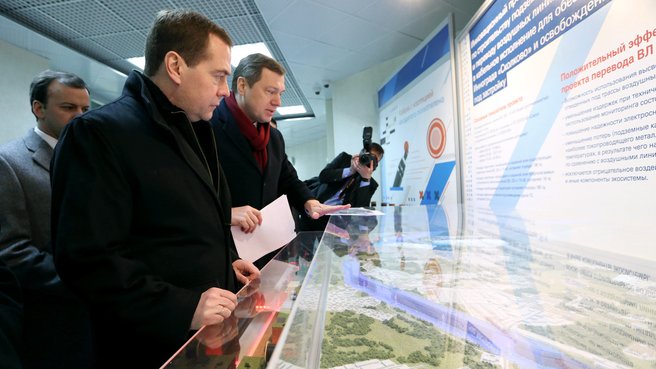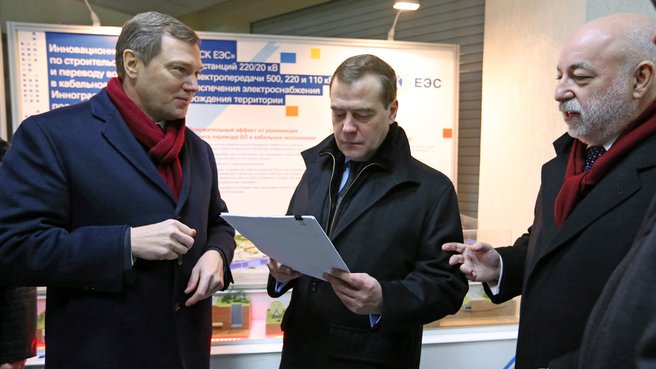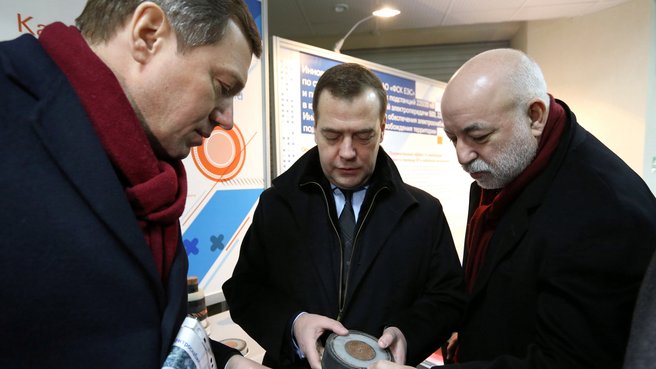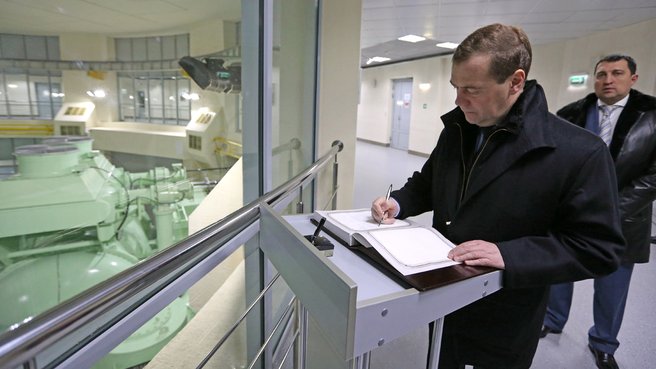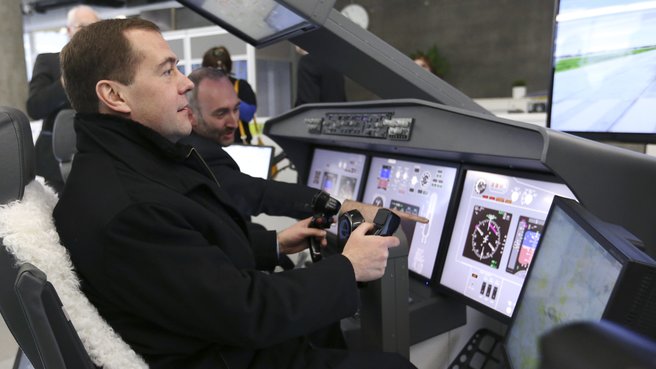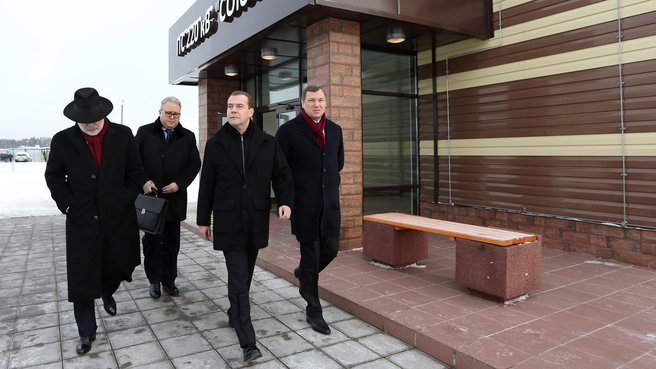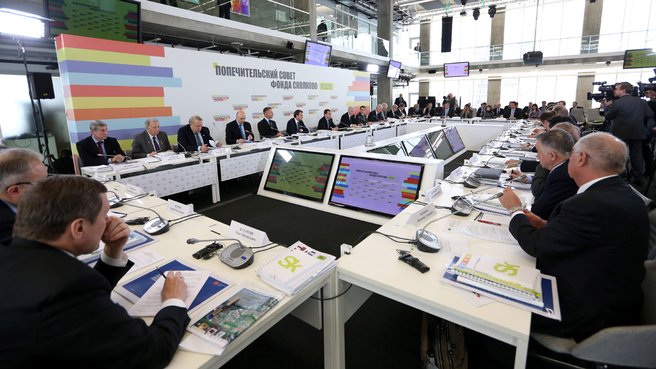The meeting took place in the Skolkovo Innovation Centre
Visiting the Soyuz underground substation at the Skolkovo Innovative Centre
Report by Martin Bouygues, co-owner of French industrial group Bouygues
Report by Suresh Prabhu, Chairman of India’s Council for Energy, Environment and Water Resources
Visiting the Soyuz underground substation at the Skolkovo Innovative Centre
Dmitry Medvedev visits the Soyuz underground substation at the Skolkovo Innovative Centre prior to the meeting
The substation with a capacity of 126 MWe will supply electricity to buildings and facilities of the Skolkovo Innovative Centre. This is Russia’s second substation with a voltage of 220 kW. Its official opening will take place before the year’s end.
A number of high-tech achievements have been used at the substation, for instance, an automated system of exercising control over technological processes and modern microprocessor-based relay protection and emergency automation devices.
In the future, the substation will charge electromobiles. It will have a uniform communications and water supply control centre and smart meters that can be operated by phone.
During his visit to the Skolkovo Centre, Prime Minister Dmitry Medvedev was told about the primary directions of development in Moscow’s new territories.
Moscow Mayor Sergei Sobyanin told Medvedev about their new growing points – the Kommunarka administrative and business centre, the Mosrentgen and Rumyantsevo areas, the Vnukovo air hub, the Bekasovo logistics centre and the Voronovo recreational zone. Mr Sobyanin pointed out that 2.27 million square metres of real estate have been put into service and over 30,000 jobs have been created since the Troitsky and Novomoskovsky administrative areas joined Moscow.
Mr Sobyanin told Mr Medvedev about a plan to almost double the length of their streets and roads, which are now 600km long. He said that three metro stations will launch in new areas and in perspective their number will increase to 17, while the length of metro lines on the territory of the new areas will almost reach 40 km.
Sobyanin mentioned major completed projects in the new areas – the Lotos City trade and exhibition centre, the Rostelecom business centre hosting 100,000 jobs, as well as several schools, outpatient clinics and residential blocs.
The Moscow Mayor told Mr Medvedev about a project to build the Vnukovo air hub with an area of 1 million square metres, a business zone and a logistic centre near Bekasovo and a business centre called Kommunarka.
During the visit to Skolkovo Innovation Centre, Dmitry Medvedev completed a Boeing737 NG simulation flight.
***
Several documents were signed in Skolkovo in the presence of Dmitry Medvedev
List of documents:
- Agreement on pilot training between Boeing and the Industrial Investors Group;
- Agreement for the supply of pilot training equipment between the Industrial Investors Group and the Transas Group;
- Agreement between the Skolkovo Foundation and Boeing for establishing a pilot training centre and creating and deploying an R&D centre in Skolkovo;
- Agreement between the Skolkovo Foundation and Schneider Electric on creating and deploying an R&D centre in Skolkovo.
* * *
Transcript of the start of the meeting:
Dmitry Medvedev: Today we are holding a meeting of the Board of Trustees of our Foundation of the Centre for the Development and Commercialisation of New Technology. This is a complicated name, but usually it is referred to simply as the Skolkovo Foundation.
Today, we’ll discuss the progress in the implementation of this project...
I’ll give a general assessment. This is what I should do. The tasks that we set when launching the project are generally being carried out. We are establishing a modern centre for commercialising technology. Importantly, we are using new principles in doing so. From the very beginning, this centre was oriented towards meeting the highest international standards. Skolkovo has already become part of the global innovative community. The ceremony of signing documents with our partners bears testimony to this fact. But the primary issue is not even this, but rather the formation of a professional community of developers who are not just bright but can reach the ultimate commercial results – something that we were not so good at. We always have plenty of ideas. The main thing is to learn how to put them to good use.
I will mention a few positions, but I won’t take the bread out of Mr Vekselberg’s mouth. He will talk about this in more detail.
Skolkovo has over 1,000 resident companies and about 13,000 new, high-tech jobs. Over 30 international and domestic companies plan to establish their research centres there.
Importantly, Skolkovo startups are entering not only domestic but also foreign markets. Over 40 companies sell their developments abroad and attract foreign investment to their projects. This investment has already reached a quarter billion dollars.
Dmitry Medvedev: "The centre is actively cooperating with Russian research organisations. Over 40 companies have been established as subsidiaries of the Russian Academy of Sciences. I think that this is important and appropriate. The foundation has provided over 1.5 billion roubles in grants for the projects of the academy’s scientists."
The centre is actively cooperating with Russian research organisations. Over 40 companies have been established as subsidiaries of the Russian Academy of Sciences. I think that this is important and appropriate. The foundation has provided over 1.5 billion roubles in grants for the projects of the academy’s scientists.
The establishment of the Skolkovo Institute of Science and Technology is another important area that is now in full swing. An endowment fund has been established for the university. The first 70 students were enrolled, and professors were invited, with half coming from abroad.
As we have said on numerous occasions, the demand for innovation should be stimulated. We see that major companies are already using the achievements of Skolkovo residents to deliver on their strategic objectives. I’m talking about segments such as fuel and energy, medicine, pharmaceuticals, IT, telecommunications, and security. I hope that these ties will grow stronger.
It should also be noted that during the meetings of the presidium of the Council for Economic Modernisation and Innovation, Skolkovo residents, who are often invited to such events, usually present reports, suggesting interesting and truly innovative solutions.
Dmitry Medvedev: "We see that major companies are already using the achievements of Skolkovo residents to deliver on their strategic objectives. I’m talking about segments such as fuel and energy, medicine, pharmaceuticals, IT, telecommunications, and security."
To conclude my opening remarks, I would like to reiterate that the Government is interested in this project’s success so that resources that are allocated from the budget to this effect, and these are substantial funds, are invested with maximum efficiency. This goes for the construction of the centre, which is gaining momentum and has now entered an active phase. I saw progress with the construction when I arrived here by helicopter and when we visited the newly launched power unit – the electrical substation, which is an up-to-date and innovative facility. Nevertheless, construction should proceed at a faster pace since it is falling slightly behind schedule. I hope that the head of the foundation and other speakers will address this issue in their reports.
Let’s get down to the agenda of today’s meeting. First, we must go over some organisational issues, as otherwise we won’t be able to work because until now I have been acting here as the Prime Minister. We must elect the governing bodies for the Board of Trustees. (To Arkady Dvorkovich) Mr Dvorkovich, go ahead.
Arkady Dvorkovich: Thank you. Mr Medvedev, colleagues, in accordance with the charter of the Skolkovo Foundation, the presidium of the Council for Economic Modernisation and Innovation has formed a new Board of Trustees. In accordance with the charter, the chairperson is elected among members of the Board of Trustees by a two-thirds majority. The chairperson of the Board of Trustees ensures the work of the board, sets the agenda, chairs meetings, and signs minutes and other documents emanating from the Board of Trustees. I hereby propose that Prime Minister Dmitry Medvedev should be elected as the chairman of the Board of Trustees.
Dmitry Medvedev: If there are no objections and no one else wants to do the job…
Arkady Dvorkovich: As far as I understand, the board members have no objections; therefore, I propose considering this decision adopted.
Dmitry Medvedev: Colleagues, thank you for your trust. Let’s continue to work. We have a report by Mr Vekselberg next. Please go ahead.
Viktor Vekselberg (President of non-profit Foundation of the Centre for the Development and Commercialisation of New Technology, Co-Chairman of the Skolkovo Foundation Council): Thank you, Mr Medvedev. The slideshow will be on shortly. Before I present my report covering the period since the previous meeting of the Board of Trustees in April 2012, I’d like to talk briefly about the foundation’s goals, mission and its key benchmarks.
The foundation’s goal is to create an ecosystem to promote entrepreneurship and research. Strictly speaking, this is our strategic goal. In August 2013, the results that we seek to achieve using this ecosystem were included in the sub-programme for creating and developing Skolkovo, which was reviewed and adopted by the Government of the Russian Federation. This slide shows the programme’s key performance indicators. I'm not going to read them aloud, but please note that the project should be worth over 200 billion roubles by the time we achieve our main goals in 2020.
For us, building an ecosystem is about building a system with basic elements. My report focuses on the fund’s achievements during the past year as they relate to the development of each subsystem of our centre.
This slide shows the key parameters. They fully comply with the programme approved by the Government. In a minute, I'll inform you about our latest achievements.
Viktor Vekselberg: Selecting and supporting the most promising and the most advanced innovation-based projects is key to building our ecosystem. We have created a representative and well-qualified expert panel. We have three Nobel Prize winners and many leading specialists from the Academy of Sciences, as well as representatives of businesses and international scientific communities on this panel.
Selecting and supporting the most promising and the most advanced innovation-based projects is key to building our ecosystem. To do this professionally and competently, we have created a representative and well-qualified expert panel with over 1,000 members. This slide shows that we have three Nobel Prize winners and many leading specialists from the Academy of Sciences, as well as representatives of businesses and international scientific communities on this panel. Most importantly, we have built a working system that ensures the independence of the appraisal (neither foundation employees, nor experts are in touch with the applicants). Also, this procedure provides full anonymity of the process.
We can claim that the decisions are taken absolutely without any bias. A pool of ten experts is formed for decision-making and a decision is adopted if at least six of them back it. The same procedure is applied in awarding resident status and giving grants for different projects. This looks a bit cumbersome but we are fairly quick in reviewing applications. Usually, it takes us a month to decide on resident status and about three months to allocate a grant.
The following table shows what happened with application reviews, resident status, how many grants were given and their sums between the sessions of the foundation’s Board of Trustees. The information is divided into clusters. You know that we have five of them. Integral indicators are quoted here. We’ve reviewed over 5,000 applications and granted residence status to over 1,000 companies. About 200 companies have received grants. Allocated grants are worth some 10 billion roubles; a bit over 6 billion that have already been received.
The next slide illustrates the performance of the participants in the project. I think it vividly shows how the residents have increased their profits over the past year and how the number of jobs is growing in our startups.
I’d like to draw your attention to the indicator linked with the intellectual activities of our startups because this is very important. Startups have submitted over 400 applications for grants. I think that working at this pace we’ll carry out our projects at top international standards.
Viktor Vekselberg: "The technology park is an important part of our centre. It provides standard services as any other technology park, such as legal advice, help in compiling business plans, information support and visa support for foreign citizens. I’d like to make a special mention of multiple-access centres."
The technology park is an important part of our centre. It provides standard services as any other technology park, such as legal advice, help in compiling business plans, information support and visa support for foreign citizens. I’d like to make a special mention of multiple-access centres.
Usually this is the most disputable issue. Before deciding what multiple-access centres we need and what equipment we should purchase, we began the auditing of the technological resource of our key partners – institutes of the Academy of Sciences and the Higher School of Economics. Before purchasing equipment, we formulated our requirements to multiple-access centres. In the process we involved a broad range of already existing centres in cooperation with our innovative centre.
These centres can provide services for our startups. Today we work with over 10 multiple-access centres that are registered in our partner organisations rather than Skolkovo. We plan to continue this work and will only buy unique equipment or the one that we don’t have. You have a large pile of documents and materials to which I’ll make references. There is also a booklet…
Dmitry Medvedev: Make references, please, but I have a request – do it briefly because this is not a report to a Communist Party congress.
Viktor Vekselberg: Okay. The information on the technology park is in the booklet. It describes in detail what centres have been set up and are operating.
We’ve launched the construction of the technology park’s building that will occupy 157,000 square metres. The next slide shows the construction schedule.
Dmitry Medvedev: When will it be completed?
Viktor Vekselberg: The building will be completed by the end of next year. The first stage will be put into service in the second quarter of 2014.
Dmitry Medvedev: I see.
Viktor Vekselberg: We’ve established the Intellectual Property Centre to help our startups register their rights. Today, 25% of Skolkovo residents use these services. We are actively cooperating with the World Intellectual Property Organisation and have received its certificate. Our partners here are the world’s leader IBM and the news agency Thomson Reuters. I think that our centre is a great success.
Viktor Vekselberg: The Skolkovo Institute of Science and Technology (Skoltech) is the second important element of our system. Its construction has already been launched. It will be built in two stages. The first one will be completed in late 2015. It will occupy 130,000 square meters and accommodate students and professors.
The Skolkovo Institute of Science and Technology (Skoltech) is the second important element of our system. You can see some basic facts about it on this slide. We have a separate question on the agenda that we’ll submit to the President. I think that we’ll receive full information on the institute after its presentation. Its construction has already been launched. It will be built in two stages. The first one will be completed in late 2015. It will occupy 130,000 square meters and accommodate students and professors about whom we spoke earlier (more than 1,000 students and postdocs). The construction schedule is displayed on the next slide.
The Open University is playing a major role in the foundation’s work. This is an instrument that allows us to draw many partners into our orbit. As you can see here, hundreds of thousands of people have displayed an interest in our project. The ultimate aim is to involve them in the project on developing the centre. The Open University has made it possible to create 25 innovative projects, nine of which received the resident status. Guys that are working together with the Open University are the first students of Skoltech.
We have a separate booklet on the Open University that has most diverse programmes – inter-cluster, inter-corporate and interregional. This is a very efficient virtual system that helps us involve broad circles of young people.
The third element is our venture partners – investment funds. This schedule shows what has been done recently. Funds are steadily showing growing interest in us. I’d say this interest is increasing at an exponential rate. In a year we’ve practically doubled the number of accredited funds. As of today they alone have invested 2.8 billion roubles in the projects of our residents. They are world leaders and buttress the status of our startups.
The fourth element is the R&D centres of our partners and corporations. Again, these figures show that we’ve doubled the number of companies that have decided to set up their own centres there. Indicatively, by 2015 the annual budget of R&D centres is expected to reach 32 billion roubles, which is a serious figure.
I’d like to emphasise that on a par with companies that are establishing R&D centres and planning to rent space from us, there is a large group of companies that have decided to build their own R&D centres. This decision is important for us because it helps us save our budget that we would have otherwise spent on building physical infrastructure.
The Open University has R&D centres that maintain close cooperation between our leading branches. I think that the composite materials centre is the most interesting one. It is working with leading aviation companies and our partners from among development institutes.
The fifth element is the town. This slide shows the construction programme with main targets. Overall, this area will occupy 2.5 million square metres. The schedule shows when facilities should be built and divide them by category. The budget and extra-budgetary sources of funding are also mentioned.
Accordingly, detailed information on these issues is available here… A special booklet has been distributed with details regarding construction terms and volumes for all facilities.
Make no mistake, we are monitoring the work of the contractors on an almost daily basis. We receive weekly progress reports with extensive data on compliance with construction schedules. As of today, we are meeting the deadlines as approved by the Government.
Viktor Vekselberg: "We work closely with the Russian Venture Company and Rusnano, which includes the cross participation of their representatives in executive bodies, tender committees and boards of directors."
I would like to make a special emphasis on our cooperation with the development institutions: we work closely with the Russian Venture Company and Rusnano, which includes the cross participation of their representatives in executive bodies, tender committees and boards of directors. Many companies supported by one of these institutions will also receive support as they move to the next stage. I think the idea of promoting innovation by supporting them at all stages is starting to gain traction and materialise little by little.
The foundation’s international outreach is another element of great importance, since we regard establishing very close ties with the international community, both industrial and academic, as our only option. Here you can see information on the agreements we have signed with the leading technology parks, which have already produced positive results, as well as universities; you can also see quantitative data on the participation of foreign companies or individuals in this work. I would like to stress that we have a programme targeting Nobel Prize winners. We recently reached an agreement with our compatriot Nobel Prize Laureate Andrei Geim to arrange and implement a special internship programme for our students in his laboratory.
Given that the foundation is after all a centre for commercialising innovations, establishing ties with business schools is also an important part of what we do apart from supporting academic research. We have established relations with the Higher School of Economics, the New Economic School and the Business School. There is a set of educational programmes focused on bringing innovations to the market, not just conducting research and development.
The success and promotion of our start-ups is the main goal of the foundation. The achievements of our projects should speak for themselves. A booklet has been distributed presenting a selection of projects that are representative of a number of clusters. The foundation is after all a venture capital institution, so it’s hard to expect every project to be successful. The success rate averages some 10%-15%. However, considering the quality of our start-ups, we are confident that this level will be reached. I encourage you to take a look at these materials in order to better understand what the foundation is actually all about.
Here’s what I wanted to say to conclude my remarks. I would like to quote a living classic, and member of the Board of Trustees, Zhores Alfyorov, who has said on a number of occasions that Skolkovo is an ideology, not a territory. It is our great desire that all the foundation’s activities, specifically, developing and supporting innovation in R&D and commercialising it, make a substantial contribution to the Russian economy in the future. Thank you for your attention.
Dmitry Medvedev: Thank you.
I would like to pass the floor to our colleagues, so they can brief us on a number of subjects, including the activities of the Skolkovo Foundation, the establishment of Skoltech, and a number of other issues regarding the foundation’s operations. The main report on this issue has given us a general impression; there are also handout materials on various subjects that deserve special attention. So I would like to hear from our colleagues and guests. I now pass the floor to Martin Bouygues, owner of a French industrial group that carries his name.
Martin Bouygues (co-owner of French industrial group Bouygues) (as translated): Thank you, Mr Chairman. Distinguished ministers, members of the Board of Trustees, it is a great pleasure for me to be here today, thank you for your hospitality. Russia is renowned for its hospitality. As a member of the Skolkovo Foundation’s Board of Trustees, I have been following with great interest the development of the innovation centre, which is expected to be at the cutting edge in a number of areas.
Being a representative of a French group, I’m interested in new technology and research, and I’m confident that promoting innovation to the benefit of our clients and the entrepreneurial spirit is in line with our commitment to offer the best products, which has been perhaps the main prerequisite for success at Bouygues since it was established in 1952. We have changed our economic model, and our goal is to cut greenhouse gas emissions and save energy, which already yields positive results since we produce more power than we consume. This is one very important example.
Another case in point is that Colas, Bouygues’ road construction subsidiary, is developing new organic materials to reduce the environmental impact. Furthermore, our television channel, TF1, has gone digital and is now available to households no matter what equipment they have, while Bouygues Telecom promotes 4G. We have also established an R&D centre similar to Skolkovo to promote start-ups in their initial stage. We are also interested in developments in Russia. Bouygues is the main shareholder of Alstom, which specialises in energy and railways and partners with Skolkovo. The Skolkovo Centre will have a floor space of 45,000 square metres. This is where Alstom’s centre will be located. I will by all means attend the opening of this centre later on, since it is very important for me. I think that this project has great prospects. Thank you.
Dmitry Medvedev: Thank you very much. I would like to pass the floor to Suresh Prabhu, Chairman of India’s Council for Energy, Environment and Water Resources. Go ahead, please.
Suresh Prabhu (Chairman of India’s Council for Energy, Environment and Water Resources) (as translated): Distinguished Prime Minister, ministers, members of the Board of Trustees, it is a great honour for me to be here on this memorable day. Such occasions are rare, which makes the pleasure of being here even greater. I’m proud of what the Skolkovo Foundation has been doing and its achievements over the last year. The fact that so much has been done within such a short period of time is truly amazing. I would like to thank you, Mr Prime Minister, for your leadership and for helping Skolkovo, since this project helps find solutions to the problems the world is currently facing by promoting new technologies and ensuring that they are commercially viable, which is very important. A lot has been done. The world’s resources are limited, while our needs are constantly growing. For that reason, we should change our mindset in order to overcome these challenges.
Suresh Prabhu: "India’s population is huge, so is its market. India’s population currently stands at 1.3 billion people. Our relations with Russia are of crucial importance. I think that India could serve as a laboratory for testing ideas developed here, expanding the boundaries of Skolkovo’s activities."
It is a great pleasure for me to join the Skolkovo family as a member of its Board of Trustees. I look forward to productive cooperation with all of you. I appreciate the words of Mr Vekselberg, who intends to visit India to understand how we can work together. India’s population is huge, so is its market. India’s population currently stands at 1.3 billion people. Our relations with Russia are of crucial importance. I think that India could serve as a laboratory for testing ideas developed here, expanding the boundaries of Skolkovo’s activities. India is also an important player on the global market. Unfortunately, unlike many of those present here I’m not a businessman. However, as a former minister, I can put forward some ideas. I think that the foundation should look beyond energy, which is one of your priorities. Unfortunately, many people in India lack access to commercially viable energy sources, while old energy sources produce greenhouse gas. We need to develop sustainable energy. I’m confident that by working together we will achieve success.
We should also work on issues related to water resources. Two billion people in the world do not have access to clean drinking water. As you know, some people can afford only a few glasses of water per day. However, water is also used for making food. We must consider how our expertise can be used to overcome water scarcity. This issue is relevant for the whole world, and we could join efforts in addressing it. I’m confident that the developing countries will accept this decision.
I would like to congratulate you one more time and invite you, Mr Prime Minister, to visit India.
Dmitry Medvedev: Thank you very much.
<…>
